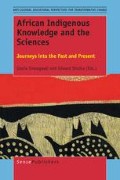Abstract
Divination is an ancient indigenous knowledge system (Hountondji, 1997; Akinwumi et al., 2007). Its cultural-institutional provenance cannot be stated with historical exactitude. It arose, philosophically and anthropologically speaking, as a result of the quest to understand, interpret and give meaningful expressions to both natural and supernatural phenomenon. Since the dawn of humanity, the human mind has always been inquisitive and interested in questions such as: Who created humanity? What controls destiny? Where do we go after death? Are there rules guiding life? Divination, therefore, evolved as a proto-scientific and metaphisico-epistemological intellectual enterprise to assist humanity in the interrogation of existential reality.
Access this chapter
Tax calculation will be finalised at checkout
Purchases are for personal use only
Preview
Unable to display preview. Download preview PDF.
References
Adelewo, E. D. (1987). Divination as an aspect of healing processes in the major religions of Nigeria. African Theological Journal, 16(1), 70–95.
Ageva, Yakpa, 74, Interview at Mbashior, Benue State date 21/11/2015.
Ajala, A. S. (2013). Ifa divination: A diagnostic and therapeutic device in Yoruba healing system. In W. E. A. Van Beek & P. M. Peek (Eds.), Reviewing reality: Dynamics of African divination (pp. 115–138). Zurich: LIT VERLAG GmbH & Co. KG Wien.
Anyanwu, K. C. (1976). Alien religions influence on African religion and social change. Ufahamu: A Journal of African Studies, 6(3), 119–134.
Apaa Bar, 68, Interview at Tsebo, Benue State; 21/11/2015.
Baby Tyoshioor, 47, Diviner, Interview at Ikpayongo, Benue State; 15/11/2015.
Barker, C. (2005). Cultural studies: Theory and practice. London: Sage Publications.
Bohannan, P. (1975). Tiv divination. In J. H. M. Beattie & Leichardt (Eds.), Studies in social anthropology. Oxford: Clarendon Press.
Ekechukwu, A. (1982). Suffering in Igbo tradition. AFER, 24.
Fachir Shirsha, 62, Diviner, Interview at Ikpayongo, Benue State; 15/11/2015
Faga Usue, 55, Interview at Makurdi, Benue State; 14/11/2015.
Foucault, M. (1978). The history of sexuality: An introduction. New York, NY: Vintage Books.
Gans, H. J. (2002). The sociology of space: A use-centered view. Washington, DC: American Sociological Association.
Greenfield, J. C., & Sokoloff, M. (1989). Astrological and related omen texts in Jewish Palestinian Aramaic. Journal of Near Eastern Studies, 48(3), 201–214.
Ikenga-Metuh, E. (1987). Comparative studies of African traditional religions. Onitsha: IMICO Publishers.
Ikenga-Metuh, E. (1991). African religions in Western conceptual schemes: The problem of interpretation: Studies in Igbo religion. Onitsha: IMICO Publishers
Ikenga-Metuh, E., & Ojoade, O. (Eds.). (1990). Nigerian cultural heritage. Onitsha: IMICO Publishers.
Lawuyi, O. B. (2003). Chaos in the public space: Environment, morality and popular culture in Nigeria. Ibadan Journal of Humanistic Studies, (No. 13 & 14).
Mama Alu 70, Diviner, Interview at Ikpayongo, Benue State; 09/12/2015.
Mbiti, J. S. (1975). Introduction to African religion. New York, NY: Praeger Publisher.
Muthengi, J. K. (1993). The art of divination in African. Journal of Evangelical Theology, 12(2), 90–104.
Oppenheim, L. (1977). Ancient Mesopotamia: Portrait of a dead civilization. Chicago, IL: The University of Chicago Press.
Radin, P. (1927). Primitive man as Philosopher. New York, NY: D. Appleton Company.
Shishima, D. S. (2007). Divination in Tiv belief system. In O. Akinwunmi, O. Okpeh, C. B. N. Ogbogbo, & A. Onoja (Eds.), African indigenous science and knowledge system: Triumphs and tribulations essays in honour of Professor Gloria Thomas Emeagwali. Abuja: Root Books & Journals Ltd.
Editor information
Editors and Affiliations
Rights and permissions
Copyright information
© 2016 Sense Publishers
About this chapter
Cite this chapter
Pine, A. (2016). Tiv Divination. In: Emeagwali, G., Shizha, E. (eds) African Indigenous Knowledge and the Sciences. Anti-colonial Educational Perspectives for Transformative Change. SensePublishers, Rotterdam. https://doi.org/10.1007/978-94-6300-515-9_8
Download citation
DOI: https://doi.org/10.1007/978-94-6300-515-9_8
Publisher Name: SensePublishers, Rotterdam
Online ISBN: 978-94-6300-515-9
eBook Packages: EducationEducation (R0)

